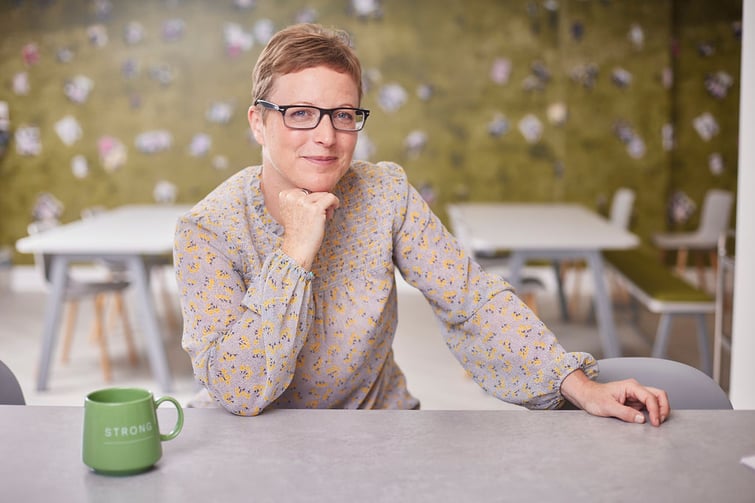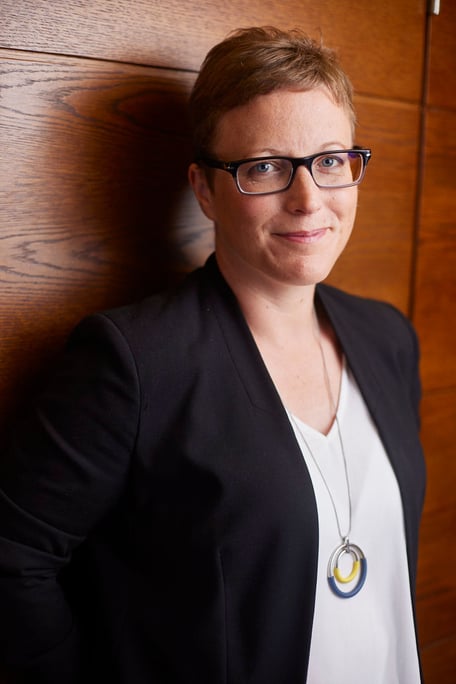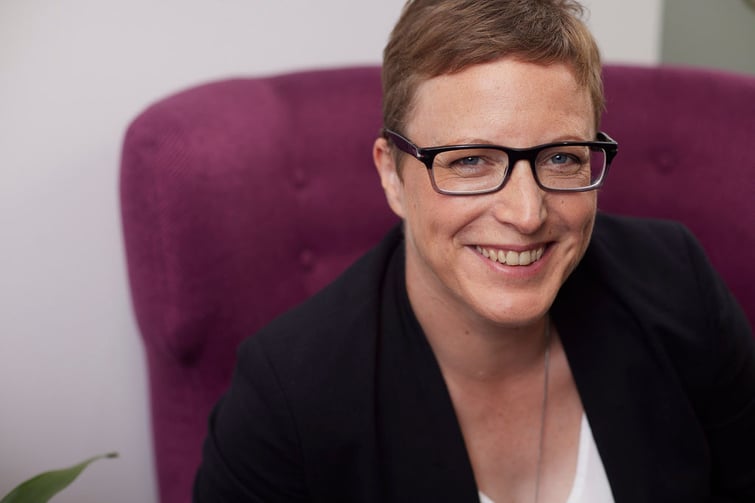Even the most progressive firm can improve working life for women.
Forward: features are independent pieces written for Mewburn Ellis discussing and celebrating the best of innovation and exploration from the scientific and entrepreneurial worlds.
In 2022 Mewburn Ellis launched its Women’s Network. The goal was to make the firm the most encouraging and supportive in the industry for women.
Fran Salisbury, a life sciences patent attorney made partner in 2015, was appointed Women’s Champion and promptly drafted a raft of bold new initiatives.
Which raises a question. Mewburn Ellis is a progressive firm. Men and women work in harmony. So what exactly needed fixing?
‘It’s true!’ admits Salisbury. ‘When we launched the network there were those in the firm who said: “We don’t have a women’s problem. So why do we need it?’ It’s a plausible take. The employee ratio is 50:50. Equal pay for equal work and we know our women feel valued. Yet there is still a need.’
She adds: ‘Women in our industry are powerful and strong. But they’ve often risen to the top by adapting to fit into what is historically a masculine-dominated profession. If we want real gender equality, we need to consider this and enable women to be the best they can be without having to make these adaptations.”
Salisbury believes women in the workplace have often prospered by fitting into patterns designed by and for men. That works for the women who can do this easily. For those with different personality types, however, it’s a barrier. This isn’t specific to the law: there are many areas of society where the absence of women in the first place means things are designed by and for men. For example, women are more likely to suffer secondary injuries in a car crash due to car designs reflecting the average male body and tested using male-representing car crash test dummies. Similarly, women are under-represented in clinical trials and this contributes to poorer outcomes for women, such as greater adverse side-effects when treated with drugs or other treatments that have been developed and tested in men.

The disadvantages for women might not be immediately obvious to a casual observer, but that doesn’t mean they don’t exist or that we should just accept them.
‘Look at how promotions function,’ says Salisbury. ‘Women tend not to self-appoint to positions as much as men do and they tend to wait until they’re overqualified before looking to step up. If you want to ensure that your leadership is representative, you need to do something more than just wait for women to appoint themselves. You have to make sure the playing field is truly level.’
There’s a mindset difference between genders, she argues, a result of the long history of men and women being raised and treated differently. ‘In society women are taught from a young age that it’s important to be liked. That often means don’t upset anyone. Don’t break the rules. Don’t get too big for your boots or show off. Don’t be bossy. The messaging that young girls get from an early age has an impact on whether they put their heads above the parapet, actively push their own careers or are willing to make decisions that people are not going to like. It leads many women to doubt and second guess themselves,’ says Salisbury.
She stresses she’s talking trends: ‘It’s not all women – of course it’s not. That’s a very important point. Women are not a giant, amorphous, helpless group of people. However, as a general rule the societal conditioning of girls is different to boys and it has an impact that often goes well beyond childhood.’
A fair company recognises these challenges. ‘An analogy might be how you might build the best house for a disabled person. Do you adapt an existing house and hope they cope? Or do you design a house around that person and their specific needs? Thinking about women in law firms and other businesses, and with an eye on equality, would we design companies the way they are today? I’m not sure we would.’
How to improve
Salisbury’s approach as Women’s Champion is to develop practical solutions. She identifies a problem, researches possible remedies and then rolls out her preferred response firm-wide. Often it’s small changes – in most cases adaptations that can often be beneficial to men too.
For example, take imposter syndrome. ‘You’ll find amazing women sitting on boards, highly qualified and still getting thoughts of: “I shouldn’t be here. They’ll find me out.” It’s not just women, of course, but it is something more commonly associated with women.’ It’s absurd, considering the qualifications and track records of the women who tend to feel this way. Even Salisbury, who took her bachelor’s in biology at the University of Bristol, PhD in molecular genetics at the University of Edinburgh and has a proven track record in patent prosecution, opposition and strategy, admits she has her moments.
The solution? ‘We look at issues women face, such as confidence and managing difficult situations where they are often expected to be nicer than men. For example, how to handle a reaction to a hard decision and avoid the risk of a woman being judged more harshly. And we provide general training around managing teams. Where possible we look to offer two types of training on the issue, with one just for women.’
Not all training is female specific and attendees can be any gender. ‘But,’ she adds, ‘we observed that there are some types of training where we think it is beneficial to have a mixed session, but also to run a women-only session. Women interact slightly differently in a roomful of women – they can be a bit more vulnerable and more open with questions. So we provide a space for them to do that.’

Some of the training is done by internal experts. Other training is by outside specialists. ‘On International Women’s Day we ran a seminar from an external training agency on imposter syndrome. It was 90% women in the room. It was very well received, because the external expertise brought a new perspective. It can be easier to ask difficult questions of someone when you aren’t going to bump into them in the corridor later.’
Parental leave is another key area. Returners can be eased back into the job at the right pace. ‘When a mum returns, half her colleagues want to pretend nothing’s happened and give her a full case load. The other half don’t want to give her anything in case it’s too much of a shock. It needs to be carefully managed.’
Salisbury is promoting mentoring for returnees. ‘We buddy up people with someone who’s been there and provide active support that way. Importantly it doesn’t have to be a women-only policy; it can work for both men and women on parental leave – and long-term sick leave too – but the network helps to bring these ideas to the fore.’
An online portal offers a place to discuss anything our people want to raise. ‘We have a section on the HIVE, our intranet, for the women’s network. Anyone can join it if they have an interest in women’s issues. We have men too, which is great, as allies are important.’
Anything and everything is up for comment. ‘We discuss women’s health issues – we recently posted about cervical screening and gynaecological cancers. We talk about women’s empowerment issues and debate topical content. We have also been looking at ways to raise the profile of inspirational women in intellectual property, such as Ava Garside, the teenage graphene pioneer who we profiled in the last issue of Mewburn Ellis Forward magazine. The push to raise the profile of women in non-fee earning roles also came from that group where our network told us who they wanted us to interview. Women championing other women is a powerful thing. We also use this group to select women’s charities to support. Overall it’s a great place to discuss things, get new ideas and run campaigns and promote events, such as training and networking.’
Mewburn the model
Part of the reason Salisbury and Mewburn Ellis are so keen to map out a strategy on promoting women is the belief that other firms can benefit from this approach. ‘We have the culture and the manpower, or indeed womanpower, to develop great initiatives,’ says Salisbury. ‘Smaller or less forward-looking firms may find it a challenge. So if we can break new ground and show positive benefits from what we are doing that others can adopt, that would be fantastic.’
A vital feature is the way Mewburn Ellis includes everyone in its diversity and inclusion drive. ‘We want everything to be available to everybody, regardless of who they are or what they do. This means all different roles, particularly those that tend to be female dominated, can grow and benefit from what we are doing,’ explains Salisbury.
Measuring success is not easy. ‘One thing we’re looking at is retention within the business. There is a trend for senior attorneys in our industry, for example, to move to become in-house legal counsel, as it’s seen as less stressful, and you are more in control of your workflow and time. We don’t have our figures at the moment but we’re working on it, and retention is one metric we’ll be looking at to see if we are having an impact.’

Salisbury is frank about the scale of the problem outside Mewburn Ellis. Everyday sexism persists. ‘I’ve had situations, outside Mewburn Ellis, where a more senior person than me has touched me or made a comment about my outfit. It can make you feel very uncomfortable and it can be really difficult to speak out, particularly if they’re in a position of power. I would be willing to bet a lot of women have had that experience.’
Women continue to endure small but annoying differences in treatment. ‘I’ll bet there are not many men who’ve had to question whether their outfit is too sexy for that meeting or whether their comments are going to be belittled because of who they come from. Women can get talked at, or talked over, rather than properly listened to.’
Overall, Salisbury’s mood is one of optimism. ‘The theme I come back to is that I don’t see this as women being a problem that needs fixing,’ she says. ‘Or that it’s so tough being a woman – that is not our focus at all. Being a woman is fantastic. It is who I am. It has really great traits, as well as certain challenges that go with it. This is about championing women to be their very best selves, so that everyone can benefit. The greatest challenge lies in identifying adjustments that allow women to thrive. We are so used to being in a man’s world these are not always easy to spot.’
A few small changes can add up to a powerful vision of how the genders live and work together. ‘It’s about ensuring that we are truly fair , and that women can be the very best they can be and men can be the very best they can be too. That makes a great environment for our people and it’s great for the firm too.’
The Mewburn Ellis formulaMewburn Ellis is improving the life of women in multiple ways. Here are the leading initiatives the firm is undertaking. Women’s Network and Champion |
Written by Charles Orton-Jones
Fran is a Partner and Patent Attorney at Mewburn Ellis. She works in all patent cycle stages within the life sciences sector – from invention capture, drafting and patent strategy to prosecution and global portfolio management. Fran is a member of our plant variety rights team, having completed the official WIPO course on plant variety protection under the UPOV convention. As such, she has extensive experience dealing with plant-related inventions, including obtaining plant variety rights and entry onto the national list and common catalogue.


-1.png)
